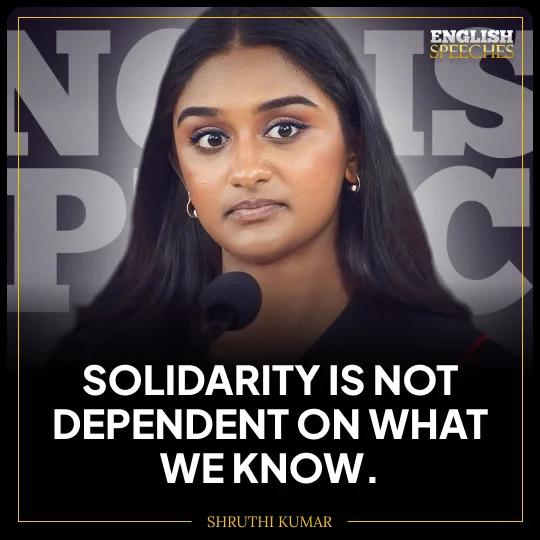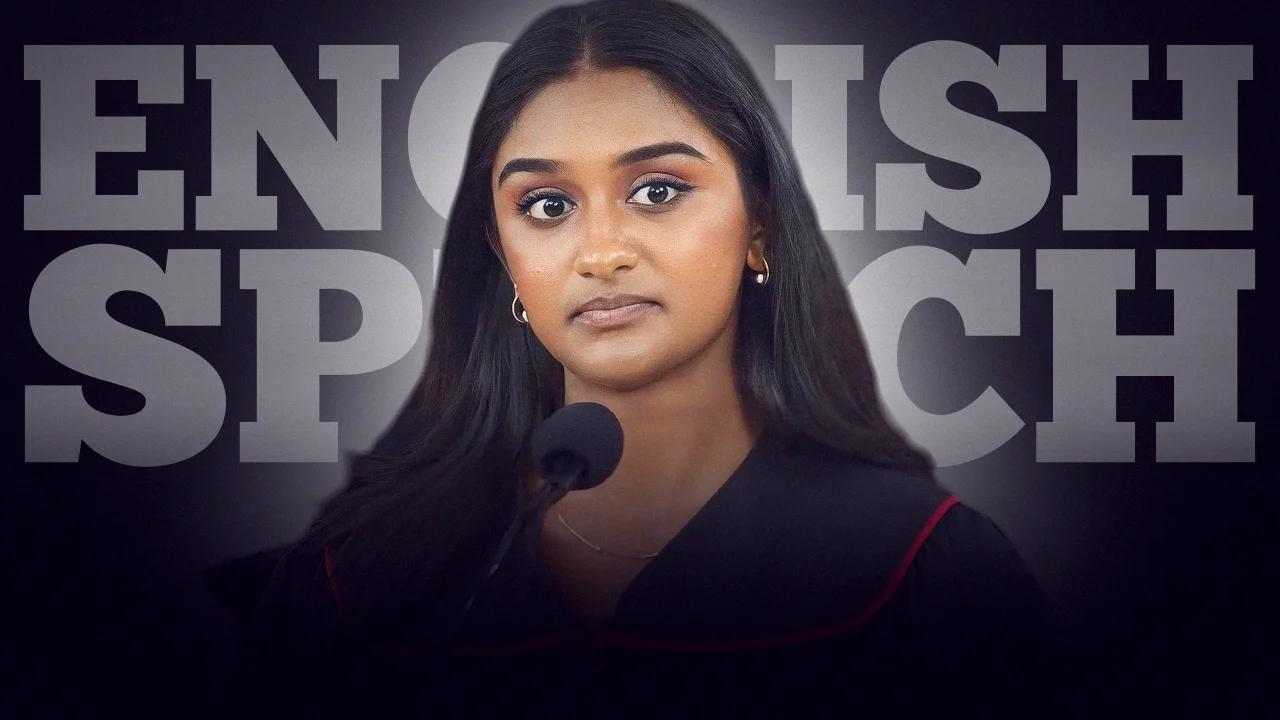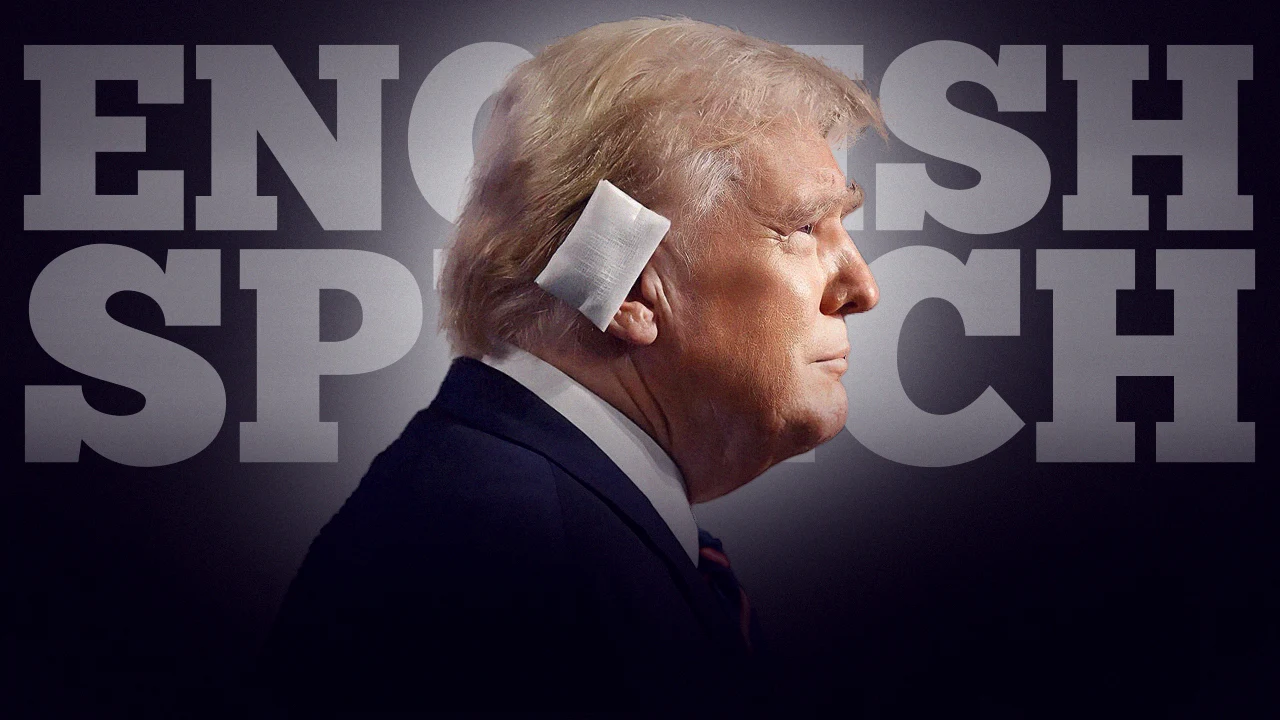Learn English with Shruthi Kumar. Join her as she delivers a powerful and moving commencement speech at Harvard University, capturing the hearts of the Class of 2024 and the world. Shruthi goes off script to address pressing civil rights issues and the importance of embracing uncertainty. From her humble beginnings in Nebraska to the hallowed halls of Harvard, Shruthi’s journey is a testament to the power of not knowing and the strength found in asking questions and seeking understanding.
Donwload available for Premium Subscribers
PDF Full Transcript
Explore every word with our concise PDF transcripts.
Audio Version
Immerse in speeches with clear, downloadable audios.
English Lesson
Enhance English skills with interactive speech lessons.
⚬ Free 30-day trial

”Solidarity is not dependent on what we know.
Download available
for Plus Members
PDF Transcript
Access the full speech in an
easy-to-read PDF format.
Audio Version
Listen and download clear,
high-quality MP3 recordings.
English Lesson
Includes vocabulary
and grammar practice.
Offer ends in:
Offer ended.
Transcript
Today, we are celebrated for what we know. In fact, for most of our lives, we’ve learned to feel a sense of accomplishment in the awards, accolades, and honors that line our childhood homes. How much we know and how we leveraged it got us far. It got us here. But today, I want to convince you of something counterintuitive that I’ve learned from the class of 2024. The power of not knowing.
I grew up in the Great Plains of Nebraska, alongside cattle ranches and cornfields. As the eldest daughter of South Asian immigrants, I was the first in my family to attend college here in the U.S. There was a lot I didn’t know. When it came time, I asked my parents how to apply to colleges. And they, too, said, “I don’t know.” The words “I don’t know” used to make me feel powerless. Like there was no answer and therefore no way. As if I was admitting defeat.
From Nebraska to Harvard, I found myself redefining this feeling of not knowing. I discovered a newfound power in how much I didn’t know. I didn’t know a field called the history of science even existed. And I now find myself a graduate of the department. Here, for the first time in my life, I had a professor of color. A historian of science who taught me history is just as much about the stories we don’t know as the stories we do. In the history of science, we often look for what is missing. What documents are not in the archives. And whose voices are not captured in history. I’ve learned silence is rarely empty. Often loud. I’ve learned this not only in the classroom but also from the class of 2024.
In reflecting on our collective moments at Harvard, I’ve realized it’s the moments of uncertainty from which something greater than we could have ever imagined grows. And our class has experienced more than our fair share of the unknown. In our first year during COVID, we didn’t have Annenberg to meet 100 people in an hour and walk out remembering five names. What did we do? Hefez became the new Annenberg, and we learned to connect differently. Building quality over quantity in our friendships. In our sophomore year, Roe Wade was overturned. And there was, and still is in many parts of the country, an omnipresent uncertainty in accessing reproductive health care. In our junior year, Harvard faced the Supreme Court and the decision to reverse affirmative action. Whether we realize it or not, we’ve been swimming in uncharted waters.
Which brings me to our senior year. A year on campus marked by enormous uncertainty. In the fall, my name and identity alongside other Black and brown students at Harvard were publicly targeted. For many of us students of color, doxing left our jobs uncertain. Our safety uncertain. This semester, our freedom of speech and our expressions of solidarity became punishable. Leaving our graduations uncertain. As I stand before you today, I must take a moment to recognize my peers. The 13 undergraduates in the class of 2024 who will not graduate today. I am deeply disappointed by the intolerance for freedom of speech and the right to civil disobedience on campus. Over 1,500 students had petitioned. Nearly 500 staff and faculty had spoken up. All overwhelmingly against the unprecedented sanctions.
As an American and as a Harvard graduate, for me, what is happening on campus is about liberty. This is about civil rights. And upholding democratic principles. The students had spoken. The faculty had spoken. Harvard, do you hear us? Harvard, do you hear us? We are in a moment of intense division and disagreement in our community over the events in Gaza. I see pain, anxiety, and unrest across campus. But it’s now, in a moment like this, that the power of not knowing becomes critical. Maybe we don’t know what it’s like to be ethnically targeted. Maybe we don’t know what it’s like to come face to face with violence and death. But we don’t have to know. Solidarity is not dependent on what we know. Because not knowing is an ethical stance. It creates space for empathy, humility, and a willingness to learn. I choose to say I don’t know, so I’m empowered to ask. To listen.
I believe an important type of learning takes place, especially in moments of uncertainty, when we lean into conversations without assuming we have all the answers. Can we see the humanity in people we don’t know? Can we feel the pain of people with whom we disagree? As we graduate, what we know, our material knowledge, may not matter so much anymore. The truth is, it’s what we don’t know and how we navigate it that will set us apart moving forward. Uncertainty is uncomfortable. But I encourage you to dive into the deep end of discomfort. Engage with the nuances. And bring with you a beginner’s mind, an ethic of not knowing. Emily Dickinson said, “Not knowing when the dawn will come, I open every door.” Thank you and congratulations.






